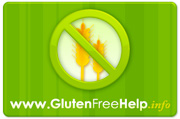It was once believed that celiac disease, caused by an autoimmune reaction to gluten, a protein found in wheat, barley, and rye, was only experienced by children and that most of them would outgrow it. To us these days, such an idea is preposterous, however it indicates something hopeful to us celiac parents—it is possible to identify gluten intolerance in our children in early childhood and even as early as infancy, so that even if our children do have celiac disease, they don’t have to suffer as long as we did without the proper diagnosis and treatment.
As an author, researcher, gluten-free advocate, and celiac mother of three grown children, I understand the concerns of mothers who are celiac, or who have celiac disease in the family, when introducing gluten-containing foods to their children, especially to infants for the first time. After all, who wants their little ones going through the painful physical as well as mental symptoms of celiac disease? And how can you tell if the food you’re feeding them is taking a toll on their health? If you have reason to suspect that your child has a genetic predisposition to celiac disease, you’ll want to be on guard for a variety of celiac disease symptoms.
The most common symptoms, which are visible in adults as well as in infants and young children, are gastrointestinal or bowel issues such as severe chronic diarrhea with floating voluminous stools, extreme weight loss to the point of wasting, and growth issues. The disease can come on at any age and affect a variety of organs, producing a variety of symptoms, in three main categories: gastrointestinal-related, malabsorption-related, such as anemia and wasting, and other symptoms, such as unexplained short stature, delayed puberty, depression and anxiety, and abnormalities in dental enamel.
The common advice when introducing new foods to infants and children is to wait three days to a week before introducing another new food, so you can observe any symptoms of allergic reaction and identify the food culprit more easily. Take care to follow this rule among children who have an increased risk of celiac disease due to family history, paying special attention to gastrointestinal problems such as stomach aches and diarrhea, which can be easy to spot in young children, or inadequate weight. Should you observe abnormal physical or mental symptoms in your child, try eliminating gluten from the diet, but make sure to consult with a pediatrician or other qualified medical practitioner before you begin making major changes to your child’s diet.
Identifying celiac disease in your young child as the culprit behind his health issues can be a challenge, especially with the variety of celiac disease symptoms, but luckily mothers today have advantages that the parents of yesteryear lacked—awareness about celiac disease, the disease’s simple and drug-free treatment, which is a diet free of gluten, and a wide array of gluten-free baby- and kid-friendly foods for children to enjoy in the case that they do have the disease.
Tina Turbin
k.m.
Resource:
About.com: Typical and Atypical Symptoms of Celiac Disease in Adults and Children http://celiacdisease.about.com/od/symptomsofceliacdisease/a/celiacsymptoms.htm
From our home to yours, Tina Turbin
If you have any questions or suggestions just email me at Info (at) TinaTurbin (dot) com.








